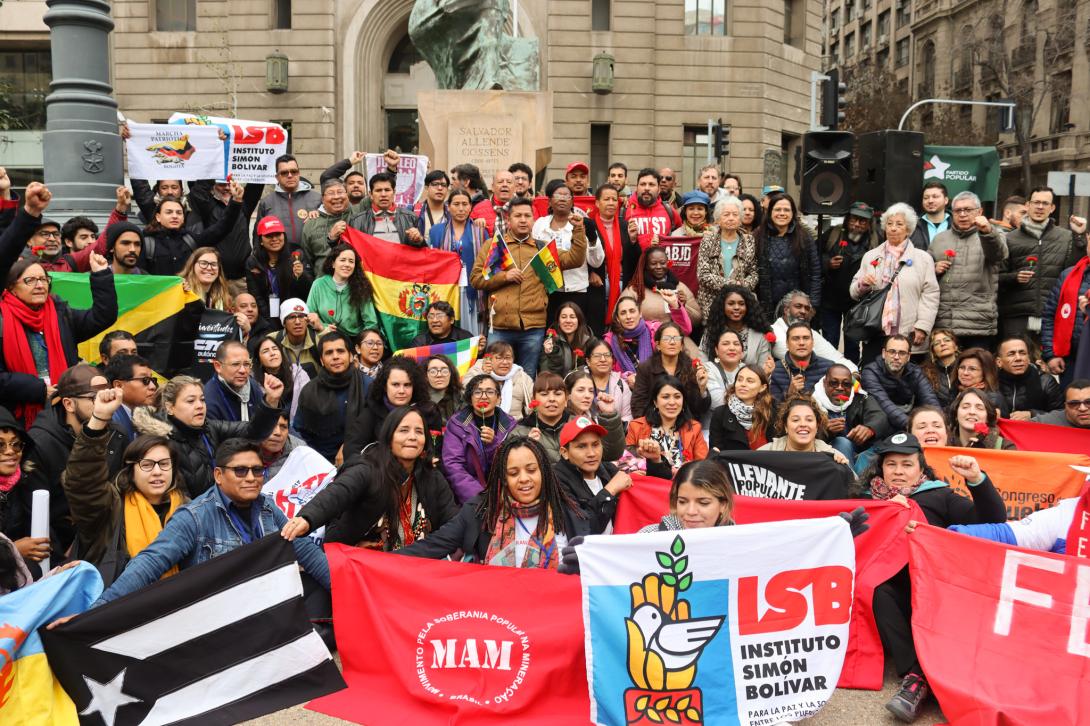Latin American and the Caribbean Dilemmas of Humanity Conference

The Latin American and Caribbean Dilemmas of Humanity Conference took place in the Recoleta District of Santiago, Chile, from September 2-4, with more than 200 activists, political leaders, and intellectuals from 100 organizations. The conference was organized by ALBA Movimientos, a regional coordination body that is part of the International Peoples' Assembly. The participants came from 23 countries in the region.
The date and country of the conference were chosen to commemorate the 53rd anniversary of the victory of President Salvador Allende and Popular Unity in Chile on September 4, 1970. On September 11, we remember the 50th anniversary of the coup d'état suffered by Allende and the Chilean people, and we raise our voices to say: "Never again!
"Let us remember Allende,” was the introductory call of Peruvian writer, sociologist, and former foreign minister Héctor Béjar during the panel on the continent's political situation. "Let's remember the stadium," he said, since it was there, in Chile's National Stadium, that the Pinochet dictatorship arrested some 40,000 people and executed some 400 between 1973 and 1990. "Around the 1970s, the US government and the Latin American oligarchies tried to exterminate us. And here we are. Your children and grandchildren are here– the new generations. And this shows that the policy of extermination has failed. On September 11, we will celebrate the failure of the extermination policy," Béjar declared.
Another panelist was Monica Bruckmann, a Peruvian political scientist and professor at the Federal University of Rio de Janeiro, who analyzed that "We are at a time of profound changes. Our Latin American and Caribbean region is once again facing the great dilemma of two political projects. The one of sovereignty, the one of the possibility of thinking about the future from our own visions and development projects. And the threat of extreme right-wing movements that are deeply violent, retrograde, and reactionary".
During the three days of the conference, the experiences of building socialism in the region were highlighted, and the successes and challenges of the Bolivarian Revolution in Venezuela and the Cuban Revolution were heard and discussed. "In Cuba, we are discussing what model we want to deepen this commitment to socialism. It cannot be a path of tiredness, exhaustion, or sacrifice. It has to be– as is our commitment in the struggles throughout the region– a path of beauty, freedom, and emancipation," Llanisca Lugo, a deputy in Cuba's National Assembly of People's Power and member of the Martin Luther King Center in Havana, told Brasil de Fato.
The three days of activities included panels and cultural activities, as well as debates in discussion groups, which focused on five axes: 1) construction of sovereignty and continental unity to confront imperialism; 2) organization of the working class; 3) the battle of culture and ideas; 4) defense of the common goods of life; and 5) construction of peoples’ democracy.
This activity is part of a process of building dialogues to advance socialism that is taking place in different regions of the planet to address the crisis of humanity and highlight the solutions that movements, governments, and workers are building to defeat the capitalist system.
The three days of the Latin America and Caribbean Dilemmas of Humanity Conference served as a preparation for the debates and proposals that this region will take to the International Dilemmas of Humanity Conference, to be held from October 14 to 18 in Johannesburg, South Africa.
>> Watch the panel "The Dilemmas of the Latin American and Caribbean People: Why Our Proposal is Socialism?"
>> Watch the panel "How to Carry Forward an Emancipatory and Unified Project at the Continental Level?"